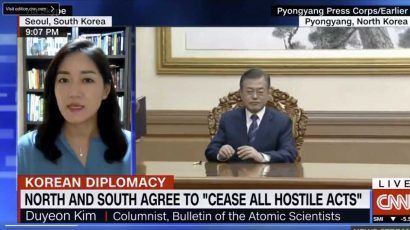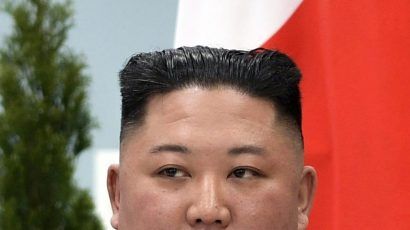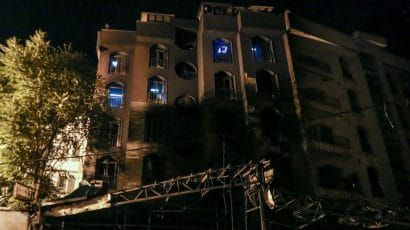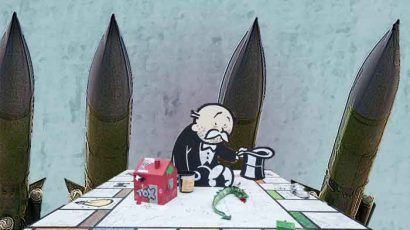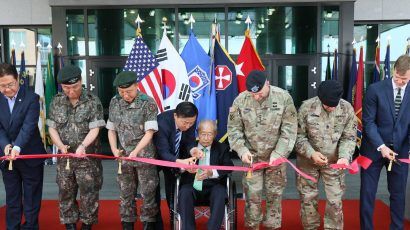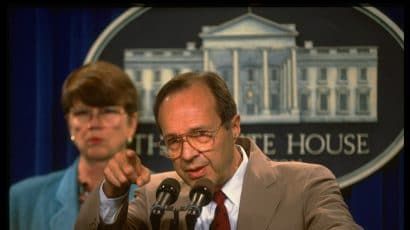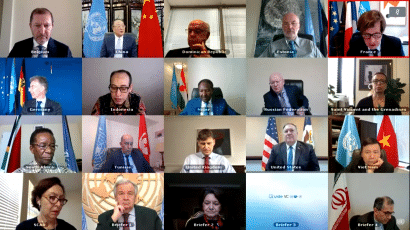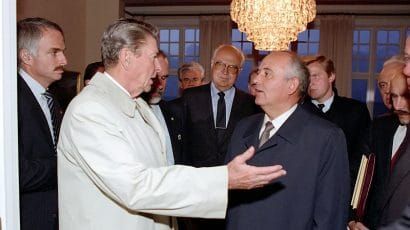Search results for trump
THE CLOCK SHIFTS CULTURE & THE CLOCK STATEMENTS The Clock Starts Running The Bulletin of the Atomic Scientists changes its format from a newsletter to a magazine. Its first cover features a clock, both conceptualized and designed by artist Martyl Langsdorf. At the time, Langsdorf designed it because “it seemed the right time on the … Continued
Turn back the Clock: The nuclear ban treaty is entering into force
The nuclear weapons ban treaty’s entry into force is a significant step to reduce the threat of nuclear disaster. It should be recognized as such when the Science and Security Board of the Bulletin of the Atomic Scientists sets the time of the 2021 Doomsday Clock.
Texas coal-plant owner: “Coal is on its way out”
A new study found that about 75 percent of coal production is more expensive than renewables. Could coal—finally—be facing the exit door?
At inter-Korean summit, little of substance on denuclearization
The leaders of North and South Korea met again this week, ostensibly with a goal of moving the peninsula they share towards denuclearization. Unfortunately they don’t seem to have done so, says Bulletin columnist Duyeon Kim, who followed the summit from Seoul. She shared her analysis with CNN.
A market-based approach to cyber defense: Buying zero-day vulnerabilities
Today, private citizens often know more about cyber threats than governments—and will happily sell their zero-day vulnerabilities to the highest bidder. This opens the remarkable possibility that defenders may be able to “drain the swamp” by buying up cyber threats on the open market.
North Korea restarted nuclear reactor for plutonium production, IAEA says
North Korea appears to have restarted a nuclear reactor in Yongbyon, according to an IAEA report released Friday, a “deeply troubling” development that suggests that the country may be at work expanding its nuclear arsenal.
Experts blame Israel for the recent explosions. Why won’t Iran?
There’s growing evidence that Israel is behind some of the recent explosions in Iran, but Iranian officials are strangely hesitant to point the finger.
To vote or to wait: The epidemic and the elections
Supposedly due to concerns about the pandemic, some states want to delay or suspend their presidential primaries. Could the novel coronavirus be taking a new victim?
Facing the myths surrounding proliferation financing
How are you to stop proliferation financing if you can't distinguish it from run-of-the-mill trade?
The nuclear elephant in the room: To restrain or disarm?
US foreign policy has shifted toward restraint in recent years. That has big implications for nuclear disarmament and nonproliferation.
How a US defense secretary came to support the abolition of nuclear weapons
In this personal essay, Perry explains how his thinking about nuclear weapons has evolved since his service in the Army of Occupation of Japan immediately after World War II.
The strategic consequences of ending the arms embargo on Iran
If the embargo expires in October, Iran may stand to profit from exporting military equipment to its neighbors. But it is unlikely to rush to buy arms from Russia or China.
When Doomsday comes, Americans will tweet
The CDC studied thousands of tweets sent by panicked Hawaiians after a false ballistic missile alert last year. Conclusion: there's no escaping social media in a nuclear emergency.
Missing from the 2019 Missile Defense Review: Cybersecurity
Faulty cybersecurity is yet another reason why dependable missile defense systems struggle to become a reality.
Women and the ban the bomb movement
Women will be at the forefront of the effort to ban the bomb—as they have been since the dawn of the nuclear age.
Romney strikes out on nukes
Last month, I profiled President Barack Obama's record on nuclear threat reduction during his first term. I concluded that, while the president has taken impressive initial steps to reduce nuclear stockpiles, secure vulnerable nuclear materials, and retard the spread of nuclear weapons, key elements of his ambitious agenda remain unfinished.
START follow-on: The Senate calculus
At long last, the United States and Russia are on the verge of signing a new treaty that reduces the countries' nuclear arsenals. The treaty, a follow-on to the landmark 1991 Strategic Arms Reduction Treaty (START), has been 95 percent complete for months, at least according to many U.S. and Russian officials, but disagreements over missile defense and verification procedures delayed the process. The result of these difficult negotiations will now face what could be equally tortuous consideration by the U.S. Senate.
The rise and demise of arms control
We have succeeded in avoiding nuclear war in the past by harnessing deterrence to arms control. If national leaders have enough foresight and wisdom, we can do so in the future, as well.
Biden and Putin signaled an openness for substantive talk
The Biden-Putin summit suggested at least a willingness—on both sides—to talk, and to do so substantively.
When to reopen the economy during the coronavirus pandemic? South Korea’s got a plan and the numbers to back it up
South Korea and the United States both logged their first cases of the novel coronavirus on the same January day. Now they stand in very different positions as they eye how to reopen their economies.



